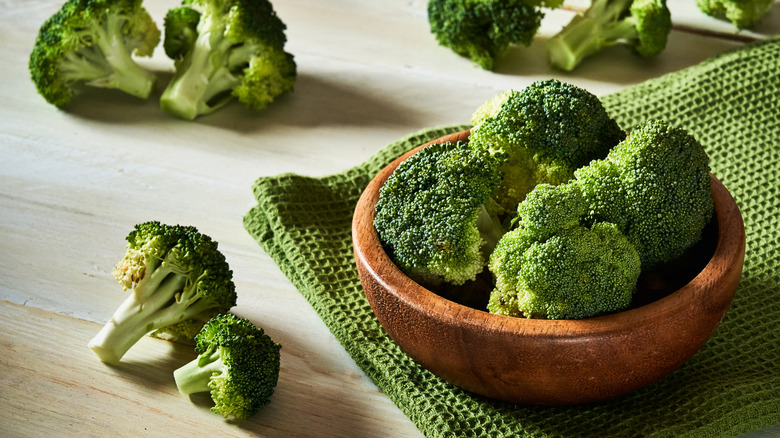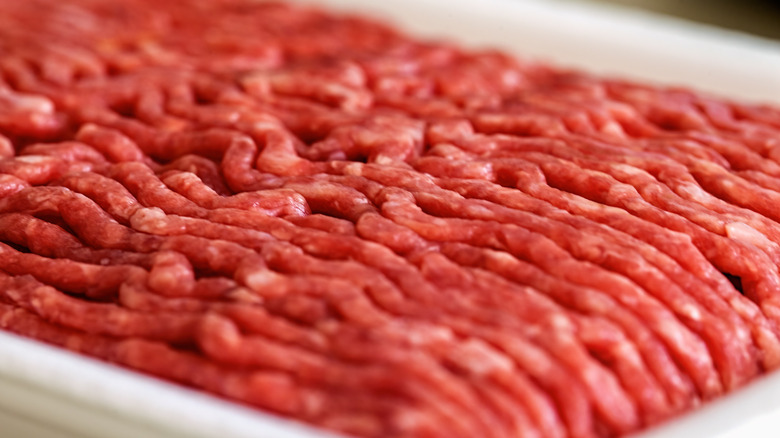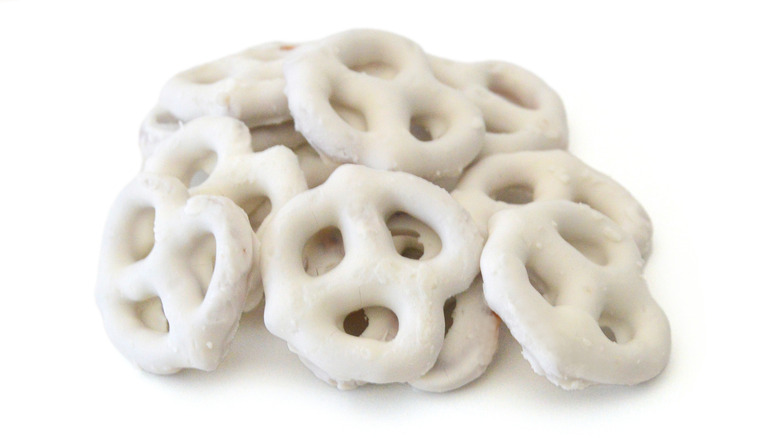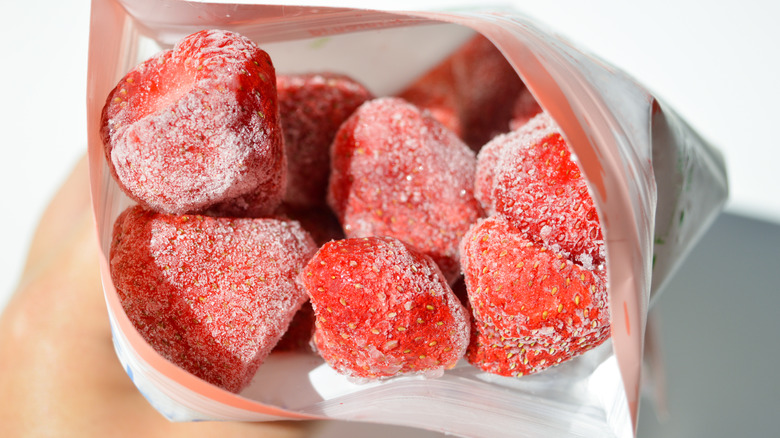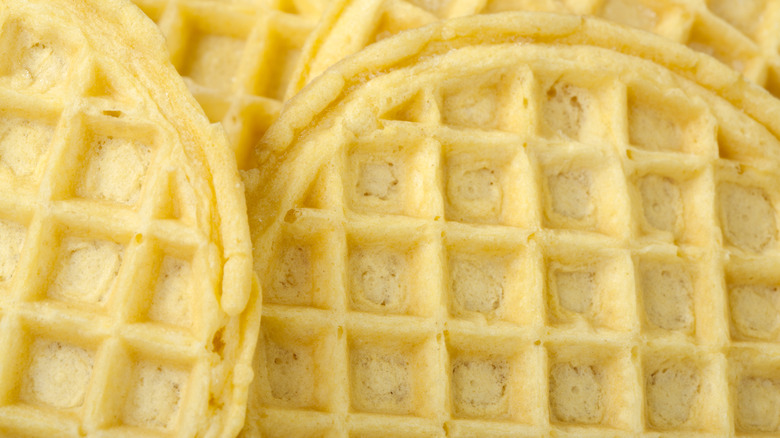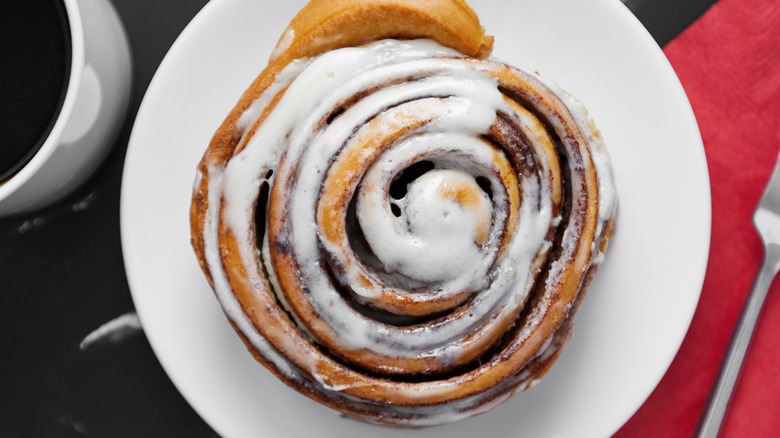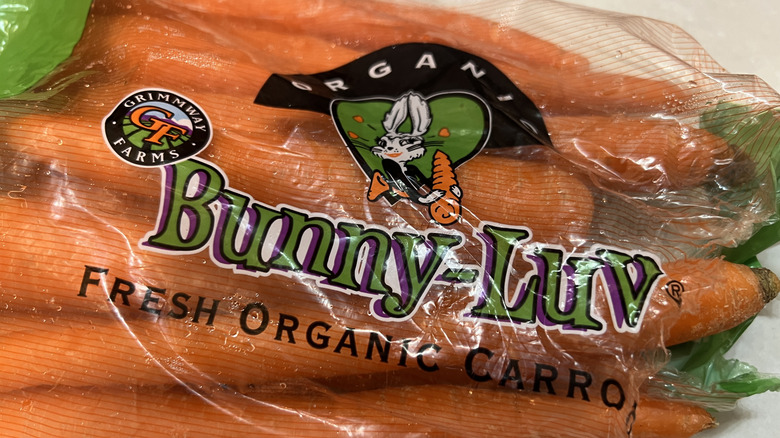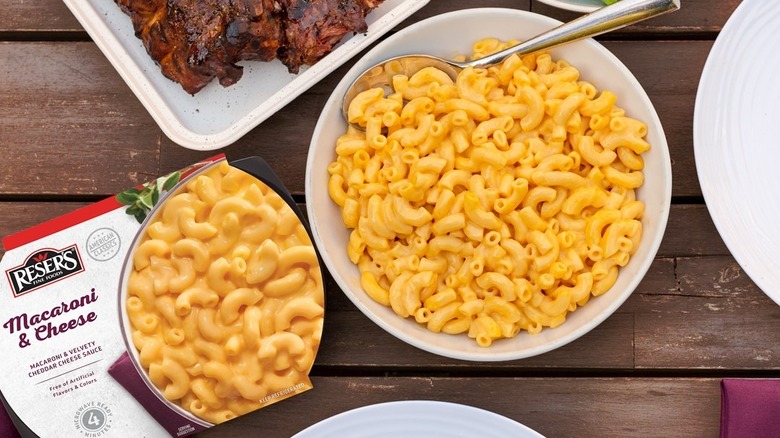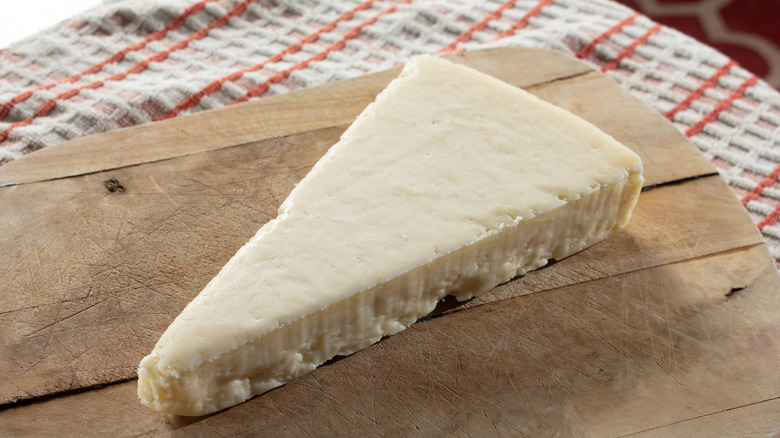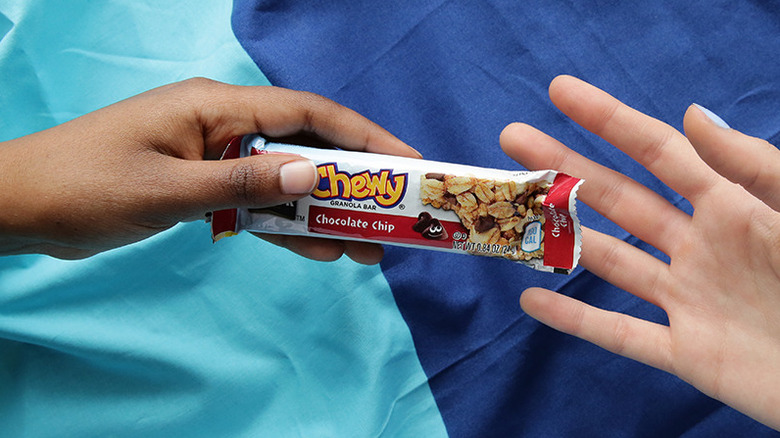12 Big Walmart Food Recalls We Couldn't Ignore
If you pay attention to FDA recalls, you'll notice it feels like there's a new one every couple of days. Many are as a result of an unlisted allergen like peanuts or milk, but others are for a potential contamination. Some of these recalls are limited in scope, but others impact the entire United States. One thing is for sure: No matter how long you look at the list, it's enough to make you want to become a hobby farmer and move off the grid. The risk of illness and food poisoning feels significant. So, when Walmart comes out with a recall, it's impossible to ignore.
Since Walmart first opened in 1962, it has evolved and grown, notably opening the first Walmart Supercenter (with grocery component) in 1988. Of course, grocery shopping changed significantly in 2020, with the big box store pivoting to include pickup and delivery, as a result of the COVID-19 pandemic. While the store has evolved, food safety laws predate even Walmart.
Upton Sinclair's "The Jungle" prompted President Theodore Roosevelt to sign the Food and Drugs Act, ushering in America's food safety era. In the world of recalls, the first was over poorly canned olives, resulting in botulism in 1920. Today, recalls may happen for a variety of reasons: microbial contaminants (like E. coli), allergens (often undeclared), chemical cross contamination, or foreign objects (like plastic). Of course, there are other reasons food may be recalled (as we'll see with macaroni and cheese), but those are some of the primary reasons Walmart recalls are impossible not to pay attention to.
Broccoli
Broccoli recalls mean less broccoli around the house and in grocery stores, to the glee of green veggie protestors everywhere. For some, like us, on the other hand, it's a hit to the very core of one delicious, nutritious, vitamin packed veggie side dish. We've even been known to include this veggie in our salads, so when we heard of the recall impacting Walmart broccoli, we ran for our broccoli stash, desperate for clearance.
On the very last day of 2024, Walmart's Marketside brand of 12 ounce bagged broccoli florets were recalled over concerns of Listeria. Unfortunately, the impacted bags had a best by date of December 10, a couple weeks before the recall was actually issued. The recall was issued by Braga Fresh following tests that the Texas Health & Human Services sampled, but the distribution spread across 20 states. Talk about late notice.
While this voluntary recall came late after expiration dates came and went and much of the concerning broccoli had likely already been consumed, those who regularly freeze broccoli will want to be on the lookout. If you discover Marketside bagged broccoli florets in the deep freezer, with a best by date of December 10, 2024, throw it out. Thankfully, even with the late news, no illnesses have been reported as a result of eating the potentially contaminated veggies.
Apple juice
While broccoli may not be everyone's favorite food, it's hard to turn down apple juice — but even this sweet drink hasn't been safe from recalls. Walmart's Great Value brand apple juice sold in packs of six 8-ounce bottles were recalled for inorganic arsenic on August 15, 2024, but the recall earned more of an elevated status a little over a week later. The bottles of concern were those marked with a best by date slated for December 28, 2024. Though not the entire country, Great Value's apple juice in question was on shelves across stores in 25 states, so the impact was widespread. To be ultra sure that you have a clean batch, you may wish to reference the Universal Product Code in question: 0-78742-29655-5. If you see that number printed under the juice's barcode, you're one of the unlucky recall participants.
The recall was issued because the arsenic level was above the 10 parts per billion (ppb) recommendation from the FDA. The Great Value apple juice was clocking in at 13.2 ppb, thus the recall. Arsenic is a concern for health problems it may induce, which include (though are not limited to) cancer and cardiovascular disease.
If you find these apple juice bottles in your pantry, you'll want to throw them out. Alternatively, you may return the juices to the store for a refund. Whatever you choose, be sure not to drink them.
Ground beef
Homemade burger lovers took a hit in the beginning of the summer of 2024 (on May 1), right as grills were heating up nationwide, when 8 tons of ground beef sold by Walmart was recalled for concerns of a potential E. coli contamination. The recall was issued by the U.S. Department of Agriculture's Food Safety and Inspection Service, and though it initially only impacted 11 states, plus the District of Columbia, it eventually extended to the rest of the United States. The beef in concern would have been manufactured on either April 26 or April 27, 2024. When checking labels, customers were told to look out for label identification with EST. 86P.
Although E. coli is a serious concern, including potential kidney failure, no illnesses were linked to the products, and the recall seems to have done its job in avoiding any major concerns. To ensure that customers have any questions they need answered, Cargill Meat Solutions even set up a hotline customers could call into if they had questions regarding the recall.
Candy
When it comes to recalls, it's easy to forget that nearly any food can be recalled, even sweet treats. White candy-coated sweets across several stores experienced this in full force during the summer of 2024. The Palmer Candy Company supplied candies to Walmart, among other larger box retailers, with a potential Salmonella contamination. The issue originated from the candy coating, and it was the supplier of this coating who alerted Palmer Candy Company about the contamination.
The original recall went into effect on May 5, 2024, but it was later upgraded on August 6. There was a large swath of foods impacted, with a wide range of best by dates. The entire list of impacted products was published by the FDA, but a good rule of thumb basically meant that if you had any Palmer Candy Company product with white chocolate covered items, it might be worth taking a second look, especially at the list. If you happen to find any of these products in your candy stashes, you can contact the Palmer Candy Company for a refund request or return the items to the store from which they were originally purchased.
Frozen fruit
More often than not — if we're hearing a fruit recall — it tends to be of the fresh fruit variety. Admittedly, it seems frozen fruits are more of a rarity in the recall world, but certainly far from impossible. Notable, the summer months of 2023 were plagued by frozen strawberry recalls across Great Value frozen fruit products. The frozen fruits of concern included both frozen strawberries as well as fruit blends that had the sweet red berry within them. All contaminated fruits originated from Willamette Valley Fruit Co. This fruit company has a long history and traces its origins back to a family farm in Salem, Oregon, and has significantly expanded since those early days of 1999.
Though other frozen fruit brands were also impacted by the recall, for Great Value, one of Walmart's private label budget brands, the dates of note began on January 24, 2023 and stretched all the way into summer on June 8, 2023. The voluntary recall was due to a potential contamination with the virus Hepatitis A in the frozen fruit. This risk can be quite severe, especially for those who may be immune compromised. While some recalls begin as a result of a test performed by an agency, this recall was voluntary, and Willamette Valley Fruit Co. began the process after it identified Hepatitis A contamination in its fruit.
Frozen waffles
Frozen waffle lovers gave their toasters a break in the fall of 2024 with the recall of many frozen waffles across several brands produced by TreeHouse Foods. Notably, at Walmart, the recall included varieties of waffles from Bettergoods as well as Great Value. This recall was initiated as a result of an inspection rather than voluntarily or even as a result of testing.
Since TreeHouse Foods makes many brands for different stores and doesn't really go by the name TreeHouse Foods, this recall might be an easy one to gloss over. However, it's definitely worth a second look because the list of brands TreeHouse Foods produces stretches from Great Value to those protein packed Kodiak cakes. With the concern being Listeria — and that it can survive in freezer temperatures — it's best to take a second look.
If you know that you have frozen waffles hanging out in your freezer, it's probably best to take the FDA list with the UPC, lot code, and best by date, and cross examine what's in your freezer. After all, even though the recall came out in 2024, many of the expiration dates reach deep into 2025. And since it's a frozen food, it definitely keeps for a longer amount of time, so those items might have been in there for awhile. For instance, Great Value has recalled waffles with expiration dates into September 2025.
Sliced cucumbers
Investigating food recalls has a way of opening up food chains to really expose just how linked everything is. The sliced cucumber recall is a great example. In mid October to mid November 2024, SunFed Produce recalled its cucumbers after several cases of salmonellosis were reported. Those veggies may have been pulled from shelves, but they were somehow not pulled from the production of slicing cucumbers. Unknowingly, then, customers were purchasing Marketside sliced cucumbers that were actually part of the initial recall. In a situation where pre-cut vegetables are advantageous and meant to save time, coming down with a case of salmonellosis certainly isn't going to make the winter season any easier.
Though the initial recall of the whole cucumbers landed several people in the hospital, the sliced cucumbers didn't spring any reported illnesses. Those who found impacted cucumbers should not only throw them away, it was also advised to clean and thoroughly sanitize surfaces so as to avoid contamination or any issues with regular food preparation in the kitchen.
Pastries
We love a homemade cinnamon roll or danish as much as the next pastry lover, but having time to make such treats is challenging. That's why pre-packaged goodies are super handy. That is, of course, until you discover there is a potential for plastic in your treat, as was the case with some Great Value pastries.
Many food recalls come with expiration dates to watch out for, but there aren't any specific expiration dates that have been reported with Great Value's recall. Instead, we have UPC and lot numbers to go by. If you have purchased cheese danishes, check for UPC 078742201177, and the concerning cinnamon rolls would have UPC 078742201160. Both pastries had Lot# L092525200 269X. In each product's case, the items were wrapped separately and sold in 12 pastries per case. The recall began on November 1, 2024 to help you gain some insight into the timeframe of the recall and what you may need to clean out of your pantry.
Carrots
When you hear of any organic veggie product, in all likelihood, you're thinking of super clean, fresh, and safe products. That's what makes this organic carrot recall all the more interesting and impossible to ignore. It started in the middle of November 2024, as customers began to prepare their Thanksgiving and other holiday menus. It was then expanded only a few days later.
In the coming weeks, carrots would be increasingly difficult to find as a vast majority of the organic carrot supply would be wiped away with the recall of whole and even baby carrots originating from Grimmway Farms. Although the packaging would not say Grimmway Farms, this recall was over several organic carrot brands you would recognize. Walmart was far from the only grocery store impacted, with carrots becoming nearly impossible to find everywhere, even into the new year.
E. coli is the concern with these carrots, and unlike some recalls, these carrots have a reported hospitalization count at 20 and a single death. If you're a regular carrot eater, you're no doubt running for your refrigerator. By now, of course, most of the carrots have been consumed, but if you happen to have some in the freezer, it's a good idea to cross reference FDA's listed best by dates for your specific brand of organic carrots.
Macaroni and Cheese
Not even the best of our comfort food is safe from the occasional recall, as we saw with Reser's Fine Foods' macaroni and cheese. In a single truck load incident, the brand was forced to recall not only its macaroni and cheese, but also several other products in the same shipment due to a failure and potential spoilage in transportation. The classic macaroni and cheese had use by dates between September 14 and 16 of 2024, but the white cheddar had a single use by date of September 11, 2024. The distribution was pretty small, only including five states, far fewer than many recalls we've seen on the Walmart stage.
Fortunately, and much to the relief of anyone who loves macaroni and cheese, these recalled products never even made it to shelves and the issue was detected before anyone could be put in real danger. Even at the time of the recall being issued, a representative for the brand explained that all items on any store shelf were safe to enjoy. It's comforting to know that recalls can protect consumers before there's a real threat.
Cheese products
Next to the recall of macaroni and cheese, possibly one of the more distressing recalls has to do with products made with cheese. A wide array of products were recalled in 2024, all containing cheese that originated from Rizo-Lopez Foods. The individual products weren't necessarily labeled with this brand, but rather the companies used cheese that was then later included in items like dips, snacks, meal kits, and even salads. As a result of the ongoing investigation, there's even newer evidence that points to a potential link to a much older Listeria outbreak several years ago.
If you do happen to have contaminated items that are likely linked to this Listeria recall, you should throw them out. Be sure to also sanitize any surfaces they came in contact with, including those in your refrigerator. Listeria can actually survive the chill of your refrigerator and could even spread, so you'll want to be abundantly cautious.
Granola bars
What is it about a granola bar that just feels safe? It's probably their steadfast presence on the shelf and unwavering occupancy in your pantry. It may even be those keen memories of a quick breakfast out the door. In any case, this beloved staple was nowhere to be found for months in 2024, all because of a significant recall.
The concern was over Salmonella, and this one recall was indeed widespread. In fact, in addition to all 50 states, Saipan, Puerto Rico, and Guam were all put on Quaker notice, and for some time. The best by dates went into October 2024, many months after the initial recall. Granola bars, cereals, granola, and even dipped bars were swiftly removed from shelves, and became very difficult to find for some time. Of course, Walmart was only one of many retailers to be impacted by this vast recall.


